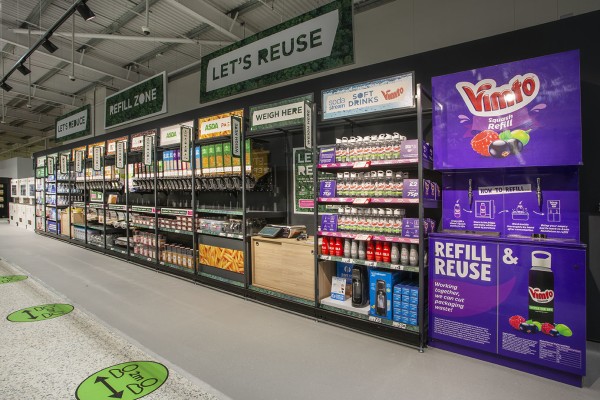It is estimated that five million tonnes of plastic is used every year in the UK, nearly half of which is used in packaging. Plastic waste often does not decompose and can last centuries in landfill or in the natural environment, which in turn can pollute rivers and oceans, soils and harm the creatures that inhabit them. Most families throw away an estimated 40kg of plastic per year, which could otherwise be recycled. However, is recycling huge amounts of plastic the answer to saving our planet?

The UK Government had a strategic ambition to “…work towards all plastic packaging placed on the market being recyclable, reusable and compostable by 2025”. In Particular, they have an “ambition” of zero avoidable waste by 2050 and a “target” of eliminating avoidable plastic waste by the end of 2042. Best get moving then.
Could there be an easier way to incorporate reducing plastic waste into our daily lives?
The latest innovation to our high streets are refill stations or dedicated refill stores. The concept behind this idea is to reduce waste and encourage reuse of plastic or glass containers to prolong their use and eliminate single use plastics.
The Co-operative

The latest supermarket to trial this concept is the Co-Operative. On 19th November 2020, The Co-op opened a brand new £3m eco-friendly concept store in Lichfield, near Birmingham. The Central England Co-op store features free water refills, eco-friendly fridges that reduce carbon footprint by 60%, and a zero-waste refill hub. The Zero-waste refill hub that is featured, will see them work with wholesale and DTC business Suma in a concept known as the Refillery.

The Refillery features large dispensers filled with Suma products that are 100% organic, vegan and Fairtrade and will allow customers to weight products into their own containers, in a bid to cut down on food packaging and waste. Other features include, free hot and cold water refills where customers can top up their own water bottles.
Asda’s Sustainability Store
Asda is another leading supermarket chain to trial a new sustainability store. The store is located in Middleton, Leeds and since opening it has unveiled their new plastic reduction strategy, with a promise that customers will not pay more for greener options.

They have partnered with some of the UK’s most popular household brands including Vimto, Kellogg’s, PG Tips, Randox and Persil to help shoppers reduce, reuse and recycle. This one store alone is set to save one million pieces of plastic per year!
Some of the new store features include:
- 15 huge refill stations which include 30 household staples from coffee beans, oats, cordial, rice and even shampoo and detergents to name a few.
- 53 fresh produce lines in total sold in a loose and unwrapped format.
- Asda’s first reverse vending machine for cans, plastic and glass drink bottles, and a hanger recycling facility which will be rolled out across all stores.
- The store will also showcase sustainable fashion lines through George, including clothing made from recycled polyester and coat hanger-less denim. George will also feature a partnership with ‘Pre-Loved’, a vintage wholesaler who will be selling bespoke vintage clothing from well- known brands- A supermarket first!
Sainsburys & Ecover

Earlier this year Sainsburys teamed up with ecologically sound brand ‘Ecover’ to trial a cleaning refill station in a bid to cut back on plastic waste. A trial in one of their superstores in North London, allowed customers to fill up on washing up liquid and detergents or alternatively, purchase Ecover products and reuse the bottles up to 50 times.
This trial was part of Sainsburys plan to reduce, reuse or replace plastic across the business’s operations as well as reducing carbon emissions.
Tom Domen, Global Head of Long-Term Innovation at Ecover, said: “At Ecover we want to challenge the idea of single use packaging and our disposable culture. This partnership with Sainsbury’s is an important step in kickstarting a REFILLUTION® in the UK and realising our goal of making refills more accessible for everyone.”
M&S ‘Fill Your Own’
Earlier this year, M&S launched a new ‘Fill Your Own’ Isle into a store in Southampton and later extended it into stores in Manchester after a positive response. They aim to address climate change challenges and encourage consumers to reduce and reuse with all products offering even better value per gram than the packaged alternatives.

After a few months trial M&S highlighted some key customer insights to the trial. Customers loved the idea as it brought an element of Family fun to shopping, portion flexibility and a chance to try new products that they normally wouldn’t purchase.
Is this what the future of grocery shopping looks like?
Will other leading supermarkets follow suit?
I know what you are thinking, but when can we expect to see this concept in their Northern Irish Stores? Maybe 2021 is the year.
In the meantime, I have discovered a new refill store in Belfast, The ‘Refill Quarter’. Opened around a year ago, they offer an endless range of home staple refills to local yummy treats.
Happy ‘Re-filling’!
Chanelle Quinn is a final year BSc Communication Management and Public Relations student at Ulster University. She can be found on: LinkedIn.

Supermarkets are on the way for a zero-waste future. Thank you 😊